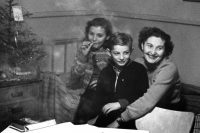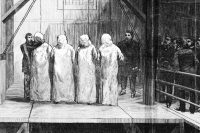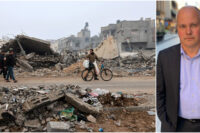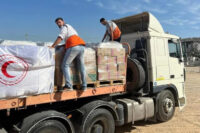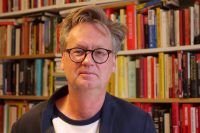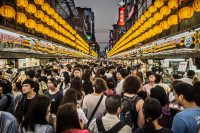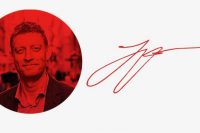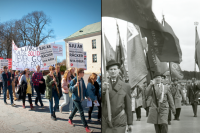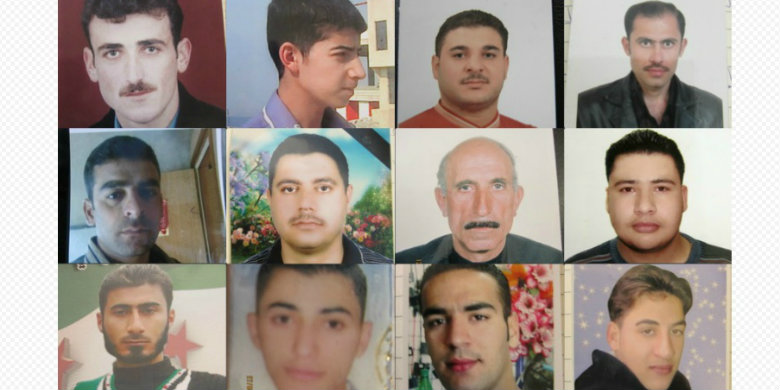
Det systematiska och extrema våldet är en medveten strategi från den syriska regimen för att stävja upproret. Civila torteras och avrättas. Våldet riktas i många fall mot barn. Det skriver Amnesty i en ny rapport med över 200 vittnesmål inifrån landet.
Våldet mot civilbefolkningen i Syrien ökar i en chockerande takt, skriver Amnesty International i rapporten ”Deadly reprisals”. Våldet är systematiskt och är en medveten strategi från den syriska regimen för att hämnas mot individer, grupper och samhällen som misstänks stödja oppositionen.
Våldet är extremt och slår blint. Det handlar dels om granatbeskjutning och automateld rakt in i bostadsområden. Dels om utomrättsliga avrättningar, tortyr och frihetsberövanden. Amnesty slår fast att det här handlar om krigsbrott och brott mot mänskligheten.
I samtliga av de 23 byar och städer som rapportförfattaren, Amnestys Donatella Rovera, besökt hittade hon drabbade familjer som berättade hur deras anhöriga släpats iväg och skjutits ihjäl av soldater. Många gånger brände soldaterna kropparna framför ögonen på de anhöriga. Många gånger var offren barn.
Mördades när de försökte rädda liv
En grönsakshandlare i staden Idlib berättade för Amnesty hur hans släkting först sköts. Och hur de som sedan försökte ta honom till sjukhus också mördades:
“We had gone out early, about 6am to go to the wholesale market but were forced to stop and take cover because of heavy shooting. We went to the house of a relative near where we stopped. Members of Military Intelligence came to the house of our relatives, where we were sheltering and asked for our ID. They checked and did not find any problem; we were not wanted. Then one of the soldiers looked at my relative’s cell phone and found a pro-revolution song. They took him outside…
“After a while when I realized that there were no soldiers in the street I went out and a neighbour told me the soldiers had shot him and then taken him to a nearby house; I went there and found him injured. He had been shot in the ear and neck but was still breathing. Some neighbours helped to carry him to the car and three of them were going to take him to a field hospital but on the way there they were stopped by soldiers and were killed. Their bodies were later found at a school, except the body of my relative who had been taken back to the house where he had previously been left for dead. They had finished him off with an additional shot to the head.”
Tre bröder skjutna och brända framför mamma
I staden Saramin berättade en mamma för Amnesty om sina tre söner som alla mördats av regimen. Sönerna hette Yousef, Bilal och Talal Haj Hussein och blev 22, 24 och 26 år gamla.
“The army came on Thursday [22 March] and so all the youths were trapped in the town. My boys were at home. On Friday [23 March] early morning, at about 6-6.30am, soldiers came and banged on the door. We were all asleep and Bilal went to open the door. They said they want to search; they asked about the small motorcycle in the courtyard and Bilal said it was his. He gave his ID and one soldier took it and put it in his shirt pocket without even looking at it. Yousef came out of the room into the courtyard and Talal also came out of his room, still wiping his eyes from the sleep. He gave his ID and a soldier also put it in his shirt pocket without looking at it.”
“They took Bilal and the motorbike outside to the street. There was a group of them searching everywhere and many others outside in the street. I could not see those outside but could hear many voices. The soldiers did not find anything in the house. They only grabbed a pair of military type trousers and said my sons are with the FSA [the opposition Free Syrian Army] but I told them everyone is wearing those trousers and they are being sold at the market. They did not take anything else.”
“They dragged Yousef and Talal out to the street. I tried to go after them but a soldier pushed his rifle against me and told me to go back. Every time I tried to go outside they stopped me. About an hour later, after the soldiers had moved from the street, my relatives and neighbours called asking for water to put out a fire. We filled buckets of water and I ran out barefoot and my daughter who had run out ahead of me screamed ‘my brothers are burning’. ”
“Yousef and Bilal were burning on the ground with several motorbikes piled over them. Yousef was shot in the side of the head and Bilal in the forehead, and Talal was lying face down, shot in head and in the back and burning from the waist down. Their hands were folded back, from how they had been tied. They were about 20 metres from the door of our home but we had to run back into the house because of heavy shooting and we could not recover the bodies until the about 7pm in the evening.”
Dog i fruns armar
I Saramin berättade frun till tvåbarnspappan Mazen ‘Abdo Midrik hur han dödades den 27 februari i familjens hem:
“On Sunday 27 February we heard shelling and since we lived on the second floor we went downstairs to my brotherin- law’s home as we thought it would be safer. My husband opened the front door so that if the army came they would not need to break down the door. I was in a semi-basement room at the back of the house with the children and other female and elderly relatives and my husband was in the house.”
“At about 11.30am I heard the army come and I heard them ask for [my husband]. Then I could not hear anything and I thought that they had taken my husband away. After a while I went upstairs to my home and found it… smashed. I returned downstairs to my brother-in-law’s apartment and found my husband dead in the bedroom. He was lying on his back with many shots in the body and legs. As I hugged his body I discovered that he also had a deep cut on his side. I stayed with the body of my husband until late afternoon because it was impossible to go outside as the soldiers were in the street in front of the house.”
15 och 21 år – mördade av regimen
I Saraqeb berättade en syster om sina två bröder, 15-åriga Uday och 21-åriga Mohamed, som mördats vid en räd.
“At about 2pm soldiers broke down the door and burst into the house. There were at least 10 of them. The men of my family were hiding because it was believed that the army was taking and/or killing any young men they found. They grabbed my son Uday and asked for his ID. I told them that he does not yet have an ID because he is just 15.”
“They left and went next door and found my brother Mohamed Sa’ad. He had shrapnel injuries in the arms and legs which he had sustained in the morning of 24 March, when he was in the market and the army came into town and many residents were injured by shooting and shelling. He was not involved with the resistance; he did not even go to demonstrations and was not wanted; he had no problem passing the army checkpoints on his way to and from Aleppo University and home. The soldiers brought him back to the house and we told them he was not involved in anything; I told them to check and if they found that he had done anything I would hand him over myself. We showed them his university card and they tore it up without even looking at it…”
“I was trying to protect Uday behind my back and they pointed their rifles at me. I tried to reason with them and we begged them and kissed their feet but they took both Uday and Mohamed Sa’ad away.”
“I tried to follow them outside and was screaming at them and they got angry and grabbed my other child, who is 10 years old and handicapped [learning disabled and mute], and threatened to kill him. As they left they set fire to the house. With my relatives we eventually managed to put out the fire, but by then my parents’ home was mostly burned down. We could not go out for fear of being shot. Only in the evening, after the army left the area I went out with some relatives and found the bodies in the street, around the corner, less than 100 metres from the house. There were nine bodies. Uday had been shot in the head and Mohamed Sa’ad had his hands tied behind his back and had been shot in the chest.”
20 medlemmar ur samma familj mördade
I Taftanaz berättar de kvinnliga överlevande från släkten Ghazal hur 20 manliga familjemedlemmar sköts ihjäl den tredje och fjärde april. Den yngsta var under 18 år. Den äldsta 75.
I den lilla byn Bsamas berättar grannar till en 54-årig åttabarnspappa hur soldater den 7 april släpade ut honom ur sitt hem, sköt honom i armar och ben och dränkte in honom i bensin och brände honom levande.
“It was about 1pm. The soldiers dragged him to a small one-room old stone house in the orchard and then I heard shots. After the soldiers left, thick smoke was coming from the house. I went with my relatives to put out the fire, thinking the soldiers had taken our neighbour away. The smoke was so thick we could not see anything, but when we shone a torch we found our neighbour burning next to the barrel of diesel which was inside the room. We poured water over him but when we tried to take the body out pieces of burned flesh came off. It was terrifying; I cannot forget the sight. I never imagined someone could do such a thing.”
Samma dag dödades ytterligare sex personer i byn, bland dem en 17-årig gymnasiestudent och en 72-årig man och hans son, en 27-årig lärare. Flera andra män i byn hade även i tidigare räder blivit mördade.
Kräver vapenembargo och frysning av tillgångar
Det här var ett axplock från Amnestys rapport. Vittnesmålen fortsätter sida upp och sida ner. Och i verkligheten blir exemplen allt fler och allt grövre för var dag som går. Förutom dessa utomrättsliga avrättningar dokumenterar Amnesty också många fall av urskiljningslösa granatattacker och beskjutningar av bostadsområden.
I rapporten kräver Amnesty ett omedelbart vapenembargo mot Syrien och att FN:s säkerhetsråd beslutar om en frysning av president Bashar al-Assads tillgångar. Amnesty kräver också att situationen i Syrien hänskjuts till den internationella brottmålsdomstolen, ICC. Tusentals människor har mist livet sedan upproret inleddes för 15 månader sedan.
Följ Dagens Arena på Facebook och Twitter, och prenumerera på vårt nyhetsbrev för att ta del av granskande journalistik, nyheter, opinion och fördjupning.







